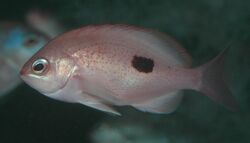Biology:Butterfly perch
| Butterfly perch | |
|---|---|

| |
| Scientific classification | |
| Domain: | Eukaryota |
| Kingdom: | Animalia |
| Phylum: | Chordata |
| Class: | Actinopterygii |
| Order: | Perciformes |
| Family: | Serranidae |
| Genus: | Caesioperca |
| Species: | C. lepidoptera
|
| Binomial name | |
| Caesioperca lepidoptera | |
| Synonyms[1] | |
| |
The butterfly perch (Caesioperca lepidoptera) is a marine species of ray-finned fish in the subfamily Anthiinae, part of the sea bass family Serranidae. This fish is found in the eastern Indian Ocean, and the southwestern Pacific Ocean, including the waters around southern Australia and New Zealand. It is sometimes known as the red perch.
Description
The butterfly perch is a laterally compressed, deep-bodied fish growing to a maximum length of 47 cm (19 in). It is a pinkish colour and has a large black spot towards the posterior end. Adults have a blue band just behind the eye, blue margins to the fins and small blue spots. The pectoral fins are about as long as the head.[2] This fish is often confused with the closely related barber perch (Caesioperca rasor).[3] However, the butterfly perch has a deeper body, and males are more pink with a dark blotch rather than band on the side.[4]
Distribution and habitat
The butterfly perch is found in the temperate waters around Australia and New Zealand at depths down to about 100 m (328 ft). In Australia it mainly occurs along the coasts of Western Australia, South Australia, Victoria, Tasmania and New South Wales. It is a schooling fish and is found on and around coastal reefs where it feeds on plankton.[2] The butterfly perch shelters in crevices and caves at night.[4]
Behaviour
The butterfly perch congregates in dense shoals in deep water near reefs.[3] It is a demersal fish, feeding on planktonic organisms and such bottom-dwelling invertebrates as sea squirts, pyrosomes, coral polyps, polychaete worms, copepods and shrimps.[5]
References
- ↑ 1.0 1.1 Bailly, Nicolas (2014). "Caesioperca lepidoptera (Forster, 1801)". WoRMS. World Register of Marine Species. http://www.marinespecies.org/aphia.php?p=taxdetails&id=280011.
- ↑ 2.0 2.1 "Butterfly Perch, Caesioperca lepidoptera (Bloch & Schneider, 1801)". Australian Museum. 2012-09-15. http://australianmuseum.net.au/Butterfly-Perch-Caesioperca-lepidoptera-Bloch-Schneider-1801/. Retrieved 2014-02-24.
- ↑ 3.0 3.1 "Caesioperca lepidoptera (Forster, 1801): Butterfly perch". FishBase. http://www.fishbase.org/summary/Caesioperca-lepidoptera.html. Retrieved 2014-02-24.
- ↑ 4.0 4.1 Bray, Dianne. "Butterfly Perch, Caesioperca lepidoptera". http://fishesofaustralia.net.au/home/species/4371. Retrieved 29 September 2014.
- ↑ Bulman, C.; Althaus, F.; He, X.; Bax, N. J.; Williams, A. (2001). "Diets and trophic guilds of demersal fishes of the south-eastern Australian shelf". Marine and Freshwater Research 52 (4): 537–548. doi:10.1071/MF99152.
- Tony Ayling & Geoffrey Cox, Collins Guide to the Sea Fishes of New Zealand, (William Collins Publishers Ltd, Auckland, New Zealand 1982) ISBN:0-00-216987-8
Wikidata ☰ Q2687823 entry
 |

